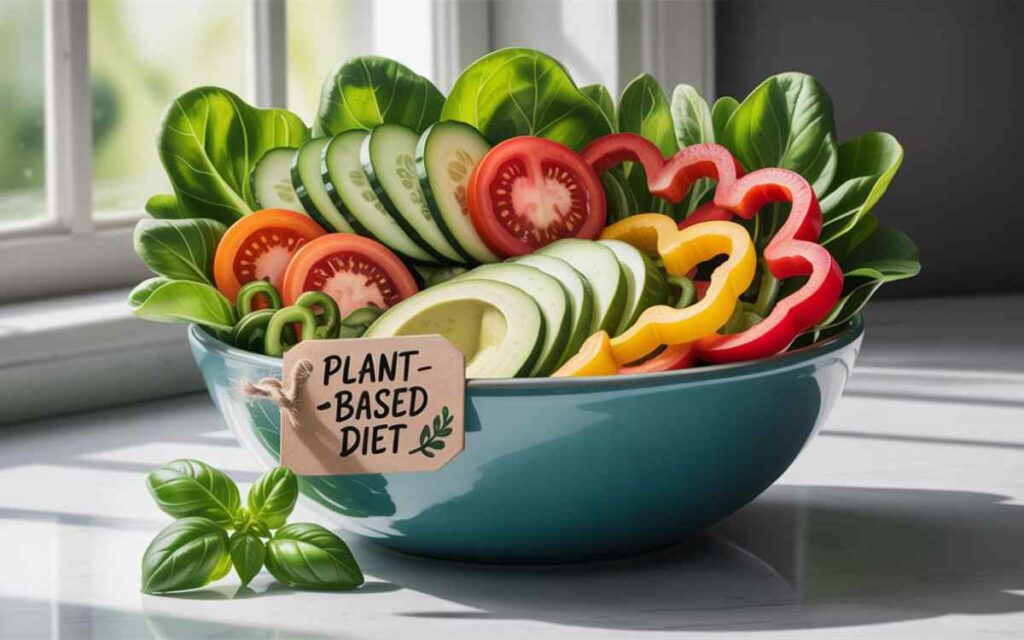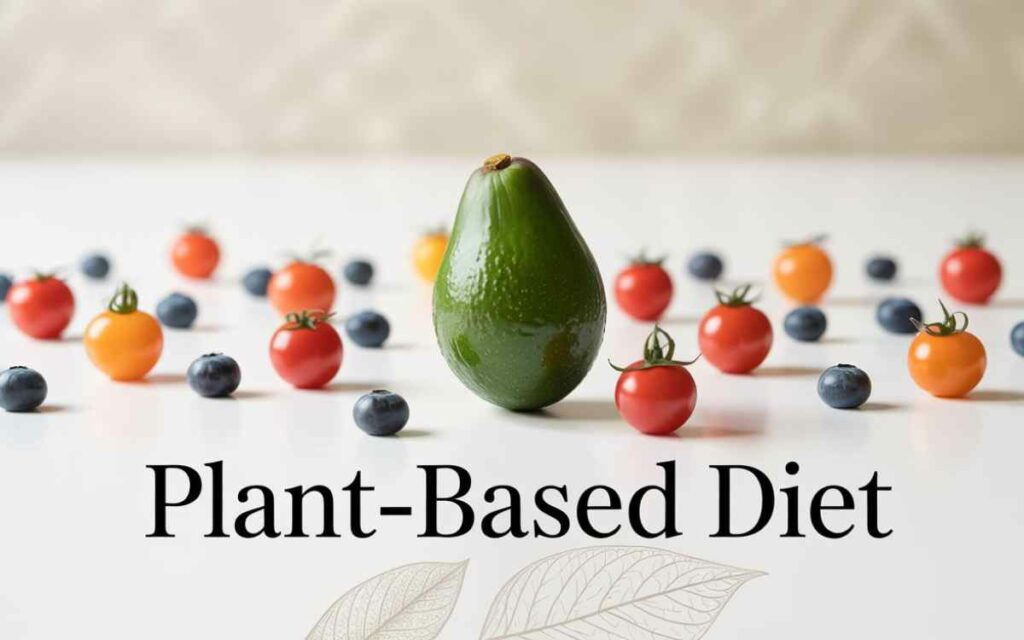Plant-Based Diet for Heart Health: Boost Your Lifespan
A plant-based diet can boost heart health significantly. It focuses on fruits, vegetables, and whole grains.
This diet is gaining attention for its benefits on heart health. Many are discovering its potential to reduce heart disease risk.
Shifting to plant-based eating can be a powerful lifestyle change. It is rooted in consuming more natural and less processed foods.
The diet promotes lower cholesterol and blood pressure levels. It also helps maintain a healthy weight.
These factors are crucial for a healthy heart. Understanding the impact of food choices on heart health is essential. A plant-based diet provides a path to better heart health.
It encourages a balanced approach to eating. This diet offers a sustainable way to support heart health naturally.

Key Takeaways:
Expert Guidance:
Benefits Of Plant-based Diet
A plant-based diet offers numerous benefits for heart health. This dietary approach emphasizes fruits, vegetables, whole grains, nuts, and seeds while minimizing animal products.
Embracing a plant-based lifestyle can lead to significant improvements in cardiovascular wellness.
From lowering cholesterol levels to reducing blood pressure, the advantages of consuming plant-based foods are compelling.
Understanding these benefits can motivate individuals to make healthier dietary choices and support their heart health.

Lower Cholesterol
Cholesterol is a waxy substance found in your blood, essential for building cells. Yet, too much can be harmful.
A plant-based diet can help manage cholesterol levels effectively. It focuses on foods that contain no cholesterol, such as fruits, vegetables, and grains.
- Fruits and Vegetables: Rich in fiber, they help lower cholesterol.
- Whole Grains: Oats and barley can reduce cholesterol absorption.
- Nuts and Seeds: Contain healthy fats and can lower LDL (bad cholesterol).
Studies have shown that individuals on a plant-based diet often have lower LDL cholesterol levels.
These foods are low in saturated fats and contain beneficial nutrients like antioxidants and phytosterols, which block cholesterol absorption.
| Food Type | Cholesterol Impact |
|---|---|
| Fruits | Lower LDL |
| Vegetables | Lower LDL |
| Whole Grains | Lower LDL |
By opting for plant-based foods, one can effectively manage cholesterol levels, promoting heart health.
Reduced Blood Pressure
High blood pressure, or hypertension, is a major risk factor for heart disease. A plant-based diet can significantly help in reducing blood pressure.
These foods are naturally low in sodium and rich in potassium, which balances blood pressure.
- Leafy Greens: Spinach and kale are high in potassium.
- Berries: Blueberries and strawberries contain antioxidants.
- Beans: Packed with fiber, they support healthy blood pressure.
Research indicates that people on plant-based diets often experience lower blood pressure levels.
The high fiber content in these foods aids in maintaining healthy blood vessels. Reducing sodium intake from processed foods also contributes to better blood pressure control.
Consider a simple meal plan:
- Breakfast: Oatmeal topped with berries.
- Lunch: Spinach salad with mixed beans.
- Dinner: Quinoa with steamed vegetables.
Choosing plant-based meals can lead to healthier blood pressure levels and improved heart health.
Nutrient-rich Foods
Eating a plant-based diet can greatly improve heart health. A key part of this diet is focusing on nutrient-rich foods.
These foods are packed with vitamins, minerals, and antioxidants that help keep the heart strong. They lower the risk of heart disease and improve overall well-being.
Let’s explore some of these nutrient-rich foods and understand how they benefit the heart.

Fruits And Vegetables
Fruits and vegetables are essential for a heart-healthy diet. They are low in calories but high in fiber and essential nutrients.
These foods help in reducing blood pressure and cholesterol levels.
Here are some fruits and vegetables to include in your diet:
- Berries: Blueberries, strawberries, and raspberries are rich in antioxidants.
- Leafy Greens: Spinach, kale, and collard greens are high in vitamins A, C, and K.
- Citrus Fruits: Oranges, lemons, and grapefruits provide vitamin C and potassium.
- Tomatoes: Packed with lycopene, which is good for the heart.
- Cruciferous Vegetables: Broccoli, cauliflower, and Brussels sprouts boost heart health.
These foods can be enjoyed in many ways. Eat them fresh, cooked, or in smoothies.
They add color and flavor to meals. Below is a table showing the nutrients found in some popular fruits and vegetables:
| Food | Key Nutrient |
|---|---|
| Blueberries | Antioxidants |
| Spinach | Iron |
| Oranges | Vitamin C |
| Tomatoes | Lycopene |
Include a variety of these foods in your meals daily for a healthier heart.
Whole Grains
Whole grains are another important part of a plant-based diet. They provide fiber, which helps maintain healthy cholesterol levels.
Whole grains are also rich in B vitamins and minerals like iron and magnesium. These nutrients are essential for heart health. Some whole grains to consider include:
- Oats: Known for lowering cholesterol due to their high fiber content.
- Quinoa: A complete protein that contains all nine essential amino acids.
- Brown Rice: Provides more fiber than white rice, aiding digestion.
- Barley: Contains beta-glucans, which help reduce cholesterol.
- Whole Wheat: Found in bread and pasta, offering nutrients and fiber.
Whole grains are versatile and can be included in every meal. They make a satisfying breakfast or a hearty dinner.
Here is how whole grains benefit the heart:
- Lower risk of heart disease.
- Improve blood pressure control.
- Help in maintaining a healthy weight.
Switching to whole grains is simple. Choose whole grain bread, pasta, and cereals. Your heart will thank you.
Plant Proteins
Eating a plant-based diet can be a great way to improve heart health. One key component is plant proteins.
These proteins come from sources like beans, nuts, and seeds. They provide essential nutrients without the saturated fats found in animal products.

Including plant proteins in your diet can lower cholesterol and reduce heart disease risk.
These proteins are also rich in fiber, which helps maintain a healthy heart by regulating blood pressure and improving digestion. Let’s explore some excellent sources of plant proteins.
Legumes
Legumes are a fantastic source of plant protein and are rich in fiber. They include beans, lentils, and peas.
These foods provide protein without adding extra fats to your diet. Legumes help lower cholesterol levels and improve heart health. They are versatile and can be added to many meals.
Consider these benefits of legumes:
- High in fiber: Helps reduce cholesterol and improve digestion.
- Rich in protein: Provides essential nutrients for muscle growth.
- Low in fat: Supports heart health by reducing saturated fat intake.
Here is a simple comparison of protein content in common legumes:
| Legume | Protein Content (per 100g) |
|---|---|
| Lentils | 9g |
| Chickpeas | 19g |
| Black Beans | 21g |
Including legumes in your diet can be simple. Add them to salads, soups, and stews.
They are affordable and easy to prepare, making them a great choice for heart-healthy meals.
Nuts And Seeds
Nuts and seeds are another excellent source of plant proteins. They provide healthy fats and essential nutrients.
These foods can improve heart health by lowering bad cholesterol levels. They are packed with vitamins and minerals that support overall well-being.
Here are some benefits of nuts and seeds:
- Rich in omega-3 fatty acids: Supports heart health by reducing inflammation.
- High in antioxidants: Protects the body from free radicals.
- Source of healthy fats: Offers essential nutrients without raising cholesterol.
Let’s look at the protein content in some common nuts and seeds:
| Nuts/Seeds | Protein Content (per 100g) |
|---|---|
| Almonds | 21g |
| Sunflower Seeds | 20g |
| Pumpkin Seeds | 19g |
Adding nuts and seeds to your diet is easy. Sprinkle them on oatmeal or yogurt. Use them in baking or as snacks.
They are convenient and boost heart health with their nutritious properties.
Meal Planning Tips
A plant-based diet can be a powerful ally in maintaining heart health. It emphasizes whole foods that are rich in nutrients, fiber, and antioxidants.
To ensure this diet supports your heart, careful meal planning is essential. With thoughtful planning, you can create balanced meals that keep your heart in top condition and make cooking simpler.
Balanced Plates
Creating balanced plates is crucial for a plant-based diet that supports heart health.
A well-rounded meal includes a variety of nutrients. Aim to fill half your plate with vegetables and fruits.
These foods are rich in vitamins, minerals, and fiber, which help reduce cholesterol and blood pressure.
Include whole grains like brown rice, quinoa, and oats. They provide energy and help regulate blood sugar levels.
Legumes such as beans, lentils, and chickpeas are excellent sources of protein and fiber.
- Vegetables: Aim for a rainbow of colors for diverse nutrients.
- Fruits: Fresh or frozen options are great for heart health.
- Whole Grains: Choose unprocessed grains for maximum benefits.
- Proteins: Incorporate plant-based proteins regularly.
Consider including healthy fats like avocados, nuts, and seeds. These fats are essential for absorbing vitamins and maintaining heart health.
Here’s a simple guide for a balanced plate:
| Category | Portion |
|---|---|
| Vegetables | 1/2 plate |
| Whole Grains | 1/4 plate |
| Proteins | 1/4 plate |
| Healthy Fats | A small amount |
Easy Recipes
Cooking plant-based meals doesn’t need to be complicated. Easy recipes can simplify your meal planning and ensure your diet is heart-healthy.
Start with simple salads. Combine mixed greens with cherry tomatoes, cucumbers, and a sprinkle of sunflower seeds. Dress with olive oil and lemon juice for a tasty and heart-friendly meal.
- Chickpea Stir-Fry: Sauté chickpeas with bell peppers, broccoli, and soy sauce.
- Quinoa Bowl: Cook quinoa and top with black beans, corn, and diced avocado.
- Veggie Wrap: Fill a whole-grain tortilla with hummus, spinach, and grated carrots.
Soups can be hearty and nutritious. Try a lentil soup with carrots and celery. This dish is easy to make and packed with fiber.
Experiment with spices and herbs. They enhance flavor without adding unhealthy fats or sugars. Remember, the simpler the recipe, the easier it is to maintain your plant-based diet.
Potential Challenges
Adopting a plant-based diet can greatly benefit heart health by reducing cholesterol levels and lowering blood pressure.
Yet, this lifestyle change may come with some potential challenges. Awareness and preparation can help in overcoming these hurdles.
Below, we’ll explore two main challenges: nutrient deficiencies and social situations.
Nutrient Deficiencies
Switching to a plant-based diet can lead to concerns about missing out on essential nutrients.
While plants offer a wide range of vitamins and minerals, some nutrients are harder to obtain without animal products.
- Vitamin B12: Mostly found in animal products. Consider fortified foods or supplements.
- Iron: Plant-based iron is less easily absorbed. Pair with vitamin C-rich foods to enhance absorption.
- Omega-3 Fatty Acids: Essential for heart health. Include flaxseeds, chia seeds, and walnuts.
- Protein: Diverse sources are needed. Combine legumes, nuts, and whole grains.
- Calcium: Crucial for bones. Opt for fortified plant milks and leafy greens.
Here’s a simple table to compare plant and animal sources of these nutrients:
| Nutrient | Plant Sources | Animal Sources |
|---|---|---|
| Vitamin B12 | Fortified cereals | Meat, dairy |
| Iron | Spinach, lentils | Red meat |
| Omega-3 | Flaxseeds, chia seeds | Fish |
| Protein | Beans, quinoa | Chicken, eggs |
| Calcium | Broccoli, almonds | Milk, cheese |
To maintain a balanced diet, plan meals carefully. Regularly check nutrient intake to ensure all needs are met.
Social Situations
Eating a plant-based diet can pose challenges in social settings. Dining out or attending events often involves limited options.
Consider these tips:
- Research Menus: Check restaurant menus online. Look for vegan or vegetarian sections.
- Communicate: Inform hosts about dietary preferences. Offer to bring a dish to share.
- Find Alternatives: Look for side dishes or modify existing meals to fit your diet.
Social events often center around food. This can be tough for those on a plant-based diet.
Being open about your dietary choices can ease pressure. Suggesting plant-based restaurants for outings can also help.
Building a support network of friends and family who understand your choices can make social situations more enjoyable. Sharing your favorite plant-based recipes might inspire others to try this healthy lifestyle.
Frequently Asked Questions Of Plant-Based Diet for Heart Health
Do Cardiologists Recommend A Plant-based Diet?
Yes, many cardiologists recommend a plant-based diet. This diet can improve heart health and reduce disease risk. Fruits, vegetables, and whole grains offer essential nutrients. Choosing plant-based foods may lower cholesterol and blood pressure. Always consult your cardiologist before making dietary changes.
What Diet Is Proven To Reverse Heart Disease?
The Ornish diet, emphasizing plant-based foods, has been shown to reverse heart disease. It focuses on whole grains, fruits, vegetables, and legumes while minimizing fats, sugars, and processed foods. Regular physical activity and stress management are also crucial components. Consult a healthcare professional for personalized advice.
Can A Plant-based Diet Remove Plaque From Arteries?
A plant-based diet may help reduce plaque buildup in arteries by lowering cholesterol and inflammation. Emphasizing fruits, vegetables, whole grains, and legumes supports heart health. Consult a healthcare provider for personalized advice.
What Is The #1 Diet For Heart Disease?
The Mediterranean diet is the top choice for heart disease. It emphasizes fruits, vegetables, whole grains, and healthy fats. This diet also includes lean proteins like fish and poultry. Limiting processed foods and red meat is crucial. It promotes heart health and reduces risk factors effectively.
Conclusion
Choosing a plant-based diet supports heart health. This diet offers numerous benefits.
It reduces bad cholesterol and improves blood pressure. Plant foods provide essential nutrients and fiber.
They help maintain a healthy weight. A balanced, plant-focused diet can lower heart disease risk.
It promotes overall well-being and longevity. Small changes make a big difference.
Start with more fruits, vegetables, and whole grains. Gradually, you will notice the positive effects.
Your heart will thank you. Remember, consistency is key. Embrace plant-based eating for a healthier heart.
Enjoy delicious meals while caring for your heart.






